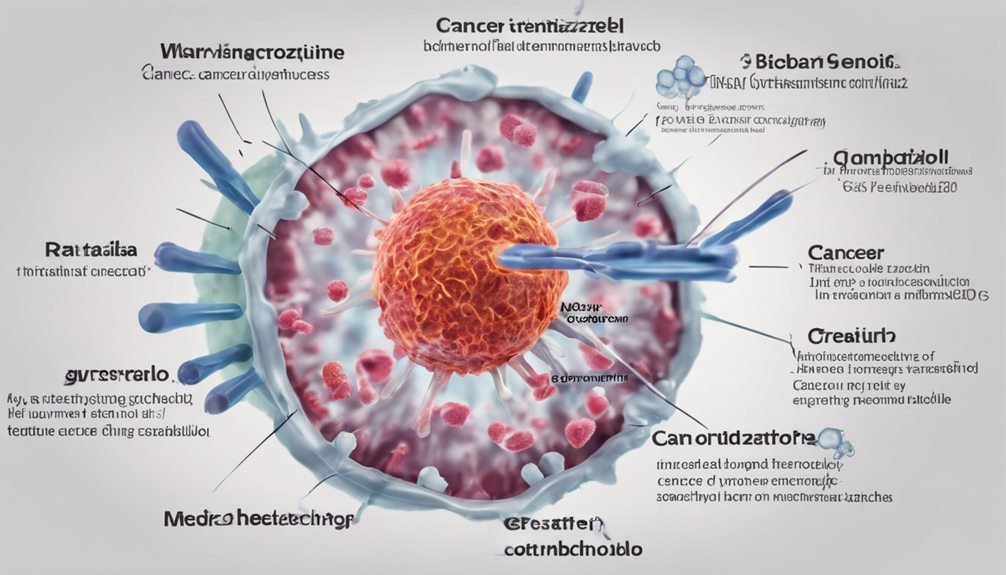You might be intrigued to learn how a humble anthelmintic drug like mebendazole has been making waves in the realm of cancer treatment. Its unexpected journey from deworming medication to a potential anticancer agent has raised eyebrows in the scientific community, prompting further exploration into its mechanisms and efficacy. The implications of repurposing mebendazole for cancer therapy are both compelling and thought-provoking, offering a glimpse into a realm where conventional drugs may hold untapped potential in the fight against cancer.
Key Takeaways
- Mebendazole repurposed for cancer treatment due to its anti-cancer properties.
- Demonstrates efficacy in disrupting tumor growth via microtubule interference.
- Shows potential in inhibiting angiogenesis and VEGF expression crucial for cancer progression.
- Promising results in various cancers with reported tumor regression and improved survival rates.
- Enhances immunotherapy effectiveness by modulating the tumor microenvironment.
History of Mebendazole
Mebendazole, a well-known anthelmintic drug, has a fascinating history rooted in its discovery and subsequent repurposing for potential cancer treatment. The discovery timeline of mebendazole dates back to the 1960s when it was initially developed as an antiparasitic medication.
Scientific breakthroughs in the early 2000s shed light on its potential anticancer properties due to its ability to inhibit microtubule formation, a crucial process for cancer cell division.
Following these discoveries, drug development efforts focused on repurposing mebendazole for cancer treatment. Clinical trials were initiated to evaluate its efficacy and safety in various cancer types, including glioblastoma and colon cancer.
Results from these trials have shown promising outcomes, with mebendazole demonstrating antitumor effects through different mechanisms beyond its anthelmintic properties.
The journey of mebendazole from an anthelmintic medication to a potential cancer treatment showcases the importance of scientific exploration and the repurposing of existing drugs for novel therapeutic purposes.
Mechanism of Action
Understanding the mechanism of action of mebendazole is essential to grasp its potential as a cancer treatment. Mebendazole exerts its effects by interfering with microtubule function, impacting various cellular targets involved in cancer progression. This interference leads to disruption of mitosis, cell cycle arrest, and ultimately apoptosis in cancer cells. Mebendazole's ability to target these crucial cellular processes highlights its therapeutic potential in combating cancer.
| Cellular Targets | Mechanism of Action | Therapeutic Potential |
|---|---|---|
| Microtubules | Interferes with microtubule function, disrupting mitosis and leading to cell cycle arrest and apoptosis | Potential to inhibit cancer cell proliferation and induce cell death |
| Vascular Endothelial Growth Factor (VEGF) | Suppresses VEGF expression, reducing angiogenesis in tumors | Ability to inhibit tumor growth and metastasis |
| Hypoxia-inducible factor 1α (HIF-1α) | Inhibits HIF-1α, reducing tumor hypoxia and promoting cell death | Potential to enhance the effectiveness of other cancer treatments |
Anti-Cancer Properties

With its demonstrated mechanism of action targeting key cellular components involved in cancer progression, mebendazole exhibits promising anti-cancer properties that warrant further investigation. Mebendazole's impact on cancer cells is attributed to its ability to disrupt cellular pathways crucial for tumor growth and metastasis.
By targeting microtubule assembly and disassembly processes, mebendazole interferes with mitosis, leading to cell cycle arrest and ultimately cell death in cancer cells. Additionally, mebendazole has shown efficacy in inhibiting angiogenesis, a process crucial for tumor vascularization and growth.
At the molecular level, mebendazole interacts with various proteins involved in cancer development, such as tubulin and vascular endothelial growth factor (VEGF). By binding to tubulin, mebendazole disrupts the formation of microtubules essential for cell division, hindering cancer cell proliferation.
Furthermore, mebendazole inhibits VEGF, reducing the formation of new blood vessels that sustain tumor growth. These interactions highlight mebendazole's potential as a novel anti-cancer agent with unique mechanisms of action that merit further exploration.
Clinical Studies
Clinical studies evaluating the efficacy and safety of mebendazole in cancer treatment have provided valuable insights into its potential as a therapeutic agent. These studies have focused on assessing patient outcomes and optimizing dosage to enhance the drug's effectiveness. Mebendazole has shown promising results in various types of cancers, with reports of tumor regression and improved survival rates in some cases.
Patient outcomes in these clinical studies have been a significant area of interest, with researchers closely monitoring factors such as tumor size reduction, progression-free survival, and overall quality of life. Mebendazole has demonstrated the ability to positively impact these outcomes, suggesting its potential as a valuable addition to existing cancer treatment regimens.
Dosage optimization has also been a crucial aspect of mebendazole research in cancer treatment. Finding the right balance between efficacy and safety is essential in maximizing the drug's benefits while minimizing potential side effects. Through careful adjustments and monitoring, researchers aim to determine the most effective dosages for different types of cancer, further enhancing mebendazole's therapeutic potential.
Synergistic Effects

Building upon the insights gained from clinical studies, the investigation now shifts towards exploring the potential synergistic effects of mebendazole in combination with other anti-cancer agents. Understanding drug interactions and dosage adjustments is crucial in maximizing the efficacy of this approach. Mebendazole has shown promise in overcoming resistance mechanisms seen in certain cancer types when used in combination with other drugs, leading to enhanced treatment outcomes.
When considering the synergistic effects of mebendazole, it's essential to analyze how different anti-cancer agents interact with each other. By combining mebendazole with specific drugs, researchers aim to target multiple pathways within cancer cells simultaneously, potentially increasing the effectiveness of treatment.
Moreover, adjusting the dosage of each drug in the combination is key to achieving optimal results while minimizing adverse effects.
Exploring the synergistic effects of mebendazole in combination therapy offers a promising avenue for improving cancer treatment outcomes. By understanding drug interactions, dosage requirements, and how mebendazole can counter resistance mechanisms, researchers strive to enhance the overall efficacy of cancer therapies.
Side Effects and Safety
Exploring the safety profile and potential side effects of mebendazole in cancer treatment is integral to understanding its overall impact on patients undergoing therapy. When considering mebendazole for cancer treatment, a thorough risk assessment is necessary to weigh the benefits against any potential adverse effects. Long-term effects of mebendazole in cancer therapy are still being studied to ensure patient safety over extended treatment periods.
| Side Effects | Safety Measures |
|---|---|
| Gastrointestinal disturbances (e.g., nausea, diarrhea) | Monitoring symptoms closely and adjusting dosage if needed |
| Liver toxicity | Regular liver function tests to detect any abnormalities early |
| Neurological effects (e.g., dizziness, headaches) | Reporting any unusual symptoms to healthcare providers promptly |
| Allergic reactions (e.g., rash, swelling) | Immediate medical attention if experiencing allergic symptoms |
Potential Applications

A growing body of research suggests that mebendazole, a well-known antiparasitic medication, exhibits promising potential as an adjunct treatment in various types of cancer. Mebendazole's versatility in cancer therapy extends beyond its antiparasitic properties, making it a compelling candidate for exploration in combination treatments and targeting novel pathways.
- Combination Treatments: Mebendazole has shown synergistic effects when used in combination with traditional chemotherapy agents, potentially enhancing the efficacy of standard cancer treatments.
- Novel Targets: Research indicates that mebendazole may act on novel targets within cancer cells, disrupting pathways crucial for cancer cell survival and proliferation.
- Immunotherapy Augmentation: Preliminary studies suggest that mebendazole could enhance the effectiveness of immunotherapy by modulating the tumor microenvironment, potentially improving outcomes for cancer patients undergoing immunotherapeutic interventions.
Exploring mebendazole in combination therapies and targeting novel pathways opens up exciting possibilities for enhancing the treatment outcomes of cancer patients, offering a new avenue for improving therapeutic strategies in the fight against cancer.
Combination Therapies
Mebendazole's potential in cancer treatment extends to its compatibility with combination therapies, where it has demonstrated synergistic effects when paired with conventional chemotherapy agents. Understanding drug interactions is crucial when considering combination therapies involving Mebendazole.
Studies have shown that Mebendazole can enhance the efficacy of certain chemotherapy drugs, leading to improved outcomes in cancer treatment. Dosing strategies play a significant role in ensuring the success of combination therapies. Proper dosing of Mebendazole alongside other chemotherapeutic agents is essential to maximize its synergistic effects and minimize potential adverse reactions.
By carefully managing dosages and schedules, healthcare providers can optimize the benefits of combining Mebendazole with conventional cancer treatments. This approach allows for a more targeted and effective attack on cancer cells while potentially reducing the overall toxicity of chemotherapy regimens.
Further research into specific drug combinations and dosing regimens is warranted to fully explore the potential of Mebendazole in enhancing cancer treatment outcomes through combination therapies.
Future Research Directions

To propel the field of cancer treatment forward, future research endeavors should focus on elucidating the molecular mechanisms underlying Mebendazole's interactions with various chemotherapeutic agents. Understanding how Mebendazole synergizes with other drugs can open doors to novel targets and therapeutic strategies.
- Exploration of Novel Targets: Investigate specific proteins or pathways within cancer cells that could be targeted by Mebendazole in combination with traditional chemotherapeutic agents.
- Development of Innovative Therapeutic Strategies: Explore the potential of using Mebendazole in different treatment regimens, such as sequential or pulsatile dosing, to enhance its efficacy in killing cancer cells.
- Investigation of Resistance Mechanisms: Study the mechanisms underlying resistance to Mebendazole in cancer cells and explore ways to overcome or prevent this resistance through combination therapies.
Patient Experiences
Patient experiences with Mebendazole in cancer treatment provide valuable insights into the real-world application of this repurposed drug. Observing treatment outcomes in patients who've undergone Mebendazole therapy has shown promising results. Some individuals reported stabilization or reduction in tumor size, while others noted improvements in symptoms such as pain and fatigue. These firsthand accounts contribute to the growing body of evidence supporting the potential efficacy of Mebendazole in cancer treatment.
Additionally, patient experiences have shed light on potential adverse reactions associated with Mebendazole. Some individuals reported mild gastrointestinal issues like nausea or diarrhea, which were generally manageable. However, a few cases of liver toxicity have been documented, emphasizing the importance of close monitoring during treatment.
Regulatory Status

The regulatory status of Mebendazole in cancer treatment is a topic of increasing interest and scrutiny within the medical community.
- Clinical Trials: Ongoing clinical trials are evaluating the efficacy and safety of Mebendazole in treating various types of cancer, providing valuable data for regulatory decision-making.
- Drug Approval: Mebendazole, an FDA-approved drug for parasitic infections, is being repurposed for cancer treatment. The process of seeking additional approvals for new indications involves rigorous evaluation of clinical trial results.
- Regulatory Considerations: Regulatory agencies like the FDA carefully assess the evidence from clinical trials to determine if Mebendazole can be approved as a cancer treatment. Factors such as safety, efficacy, and dosage are crucial in this evaluation process.
As Mebendazole shows promise in inhibiting cancer cell growth and promoting cell death, the regulatory landscape surrounding its use in cancer treatment is evolving. The outcomes of current clinical trials will play a significant role in shaping the drug's regulatory status for cancer therapy.
Conclusion and Outlook
An examination of the current landscape surrounding Mebendazole in cancer treatment reveals a pivotal moment where scientific advancements intersect with regulatory considerations. As research continues to uncover the potential of Mebendazole in cancer therapy, future directions point towards exploring its efficacy in various types of cancers and in combination with other treatments. Clinical trials are essential to validate its effectiveness and safety further. Patient testimonials also play a crucial role in understanding the real-world impact of Mebendazole on individuals battling cancer. These firsthand accounts provide valuable insights into its potential benefits and side effects, helping to shape future research and clinical practice.
Looking ahead, the integration of Mebendazole into mainstream cancer treatment regimens holds promise for improving patient outcomes and quality of life. However, continued research is needed to elucidate the full extent of its therapeutic potential and optimize its use in clinical settings. By staying abreast of emerging scientific findings and incorporating patient perspectives, healthcare providers can better serve cancer patients by harnessing the surprising potential of Mebendazole in cancer treatment.
Frequently Asked Questions
Can Mebendazole Be Used in Combination With Immunotherapy for Cancer Treatment?
Yes, mebendazole can be used in combination with immunotherapy for cancer treatment. This approach harnesses the synergistic effects of both treatments.
Mebendazole's mechanism of action involves disrupting microtubule function in cancer cells, enhancing the immune system's response to tumors. Combining it with immunotherapy can further boost the body's ability to recognize and fight cancer cells, potentially leading to improved treatment outcomes for patients.
Are There Any Ongoing Clinical Trials Testing Mebendazole in Rare Cancers?
In rare cancer trials, researchers are exploring mebendazole effectiveness. The potential of this drug in treating uncommon cancers is being investigated through ongoing clinical trials. Observing how mebendazole interacts with these specific types of cancer could provide valuable insights into new treatment options.
Stay tuned for updates on the progress of these trials and the impact they may have on improving outcomes for patients with rare cancers.
How Does Mebendazole Impact Tumor Microenvironment in Cancer Patients?
When considering how mebendazole impacts the tumor microenvironment in cancer patients, it's important to note its effects on immune modulation and tumor angiogenesis.
Mebendazole has shown potential in altering the immune response within the tumor microenvironment, potentially enhancing the body's ability to fight cancer cells.
Additionally, it may inhibit tumor angiogenesis, the process by which tumors form new blood vessels to support their growth and spread.
Can Mebendazole Be Used as a Preventive Treatment for High-Risk Individuals?
For high-risk individuals, considering mebendazole as a preventive treatment can offer long-term benefits by potentially impacting tumor development. Its cost-effectiveness and known safety profile make it an attractive option for early intervention strategies.
Further research is needed to establish its efficacy and safety in this context. However, exploring mebendazole's potential as a preventive measure may hold promise in the realm of cancer prevention for those at increased risk.
What Is the Optimal Dosing Schedule for Mebendazole in Cancer Therapy?
To optimize mebendazole's efficacy in cancer therapy, consider dosing frequency. It's vital to find a balance between maximizing benefits and minimizing side effects for tolerability. Monitoring patient response and adjusting dosing schedules accordingly can enhance treatment outcomes.
Striking the right balance is crucial in achieving therapeutic effectiveness while managing potential adverse effects. Tailoring the dosing regimen based on individual patient needs can lead to improved outcomes in cancer therapy.
Conclusion
In conclusion, the remarkable capabilities of mebendazole in cancer treatment have been a pleasant surprise, offering a new avenue for therapeutic intervention. Further research is needed to fully understand its potential and optimize its use in clinical settings. With promising results in preclinical and clinical studies, mebendazole holds great promise for improving treatment outcomes and enhancing the quality of life for cancer patients. Exciting developments lie ahead in harnessing the full potential of this unexpected ally in the fight against cancer.





